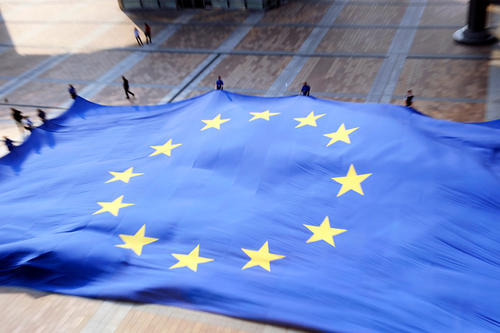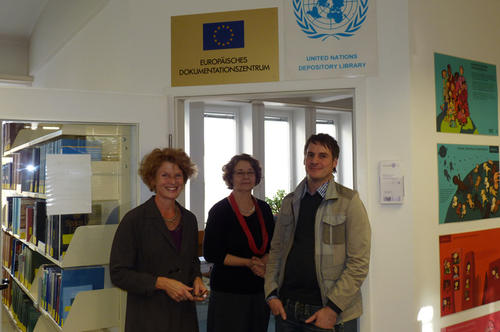Watching Europe Grow Together
European Documentation Centre at the University Library at Freie Universität turns 50
Jan 27, 2014
Focus on Europe: The European Documentation Centre (EDC) has been supplying students, faculty, and staff of the university and other research institutions with information for 50 years.
Image Credit: European Parliament / Pietro Naj-Oleari
The Documentation Center team: Sabine Hertel, Bettina Palm, and Michael Franke.
Image Credit: Bianca Schröder
Flight routes at Berlin’s new airport, the Erasmus exchange program, the European Union’s free trade agreements – topics like these are reflected in the theses and dissertations of many students at Freie Universität. They are supported in this process by the European Documentation Centre (EDC) located on the second floor of the University Library.
It is part of a Europe-wide network of informational institutions founded by the European Commission in 1963 as part of its information and communication policy. Its task is to supply students, faculty, and staff of the university and research institutions with information on the European Union.
The University Library already had experience with official documents, publications, and periodicals when the EDC opened in Dahlem. “The United Nations Depository Library was placed here in 1953, and before that, there had already been an office of official publications,” says Sabine Hertel, the librarian in charge of the EDC. Over decades, huge volumes of documents arrived at the UN/EU documentation center – until the digital age made it possible to access these materials anytime, anywhere, via the Internet“
Many publications are now stored in databases and available online. That means the focus of our job has shifted more toward advising and away from administration, as we help users find their way through the jungle of the EU server,” Hertel explains.
Still, the documentation center received 320 printed works from the European Union last year, and the United Nations sent about 200 publications. The library also purchases secondary literature on the many issues and questions surrounding European integration and the fields of policy pursued by the United Nations.
Scholars of Law and Political Science Make Up Largest User Group
The documentation center at Freie Universität is one of 46 EDCs in Germany, most of them hosted by universities. In 2003, they teamed up to launch a project called ArchiDok with the aim of digitally archiving and offering access to texts from EU institutions, especially studies and working papers
There is certainly demand from the users, Hertel says. “Alongside students, including doctoral candidates, we also receive regular visits from employees of law firms, who come to us with very specific questions. The German Federal Foreign Office has even obtained documents from us.” Scholars of law and political science make up the largest group of users.
The team at the library enjoys the lively exchange of information, Hertel says. “The questions we receive cover a very wide range of topics, and we have excellent working relationships with the EDC network with which we are building the ArchiDok database.” And last but not least, of course, she also says she appreciates always being up to date on political events in Europe.
Further Information
Sabine Hertel, University Library, Freie Universität Berlin , Tel.: +49 30 838 56497, Email: hertel@ub.fu-berlin.de


